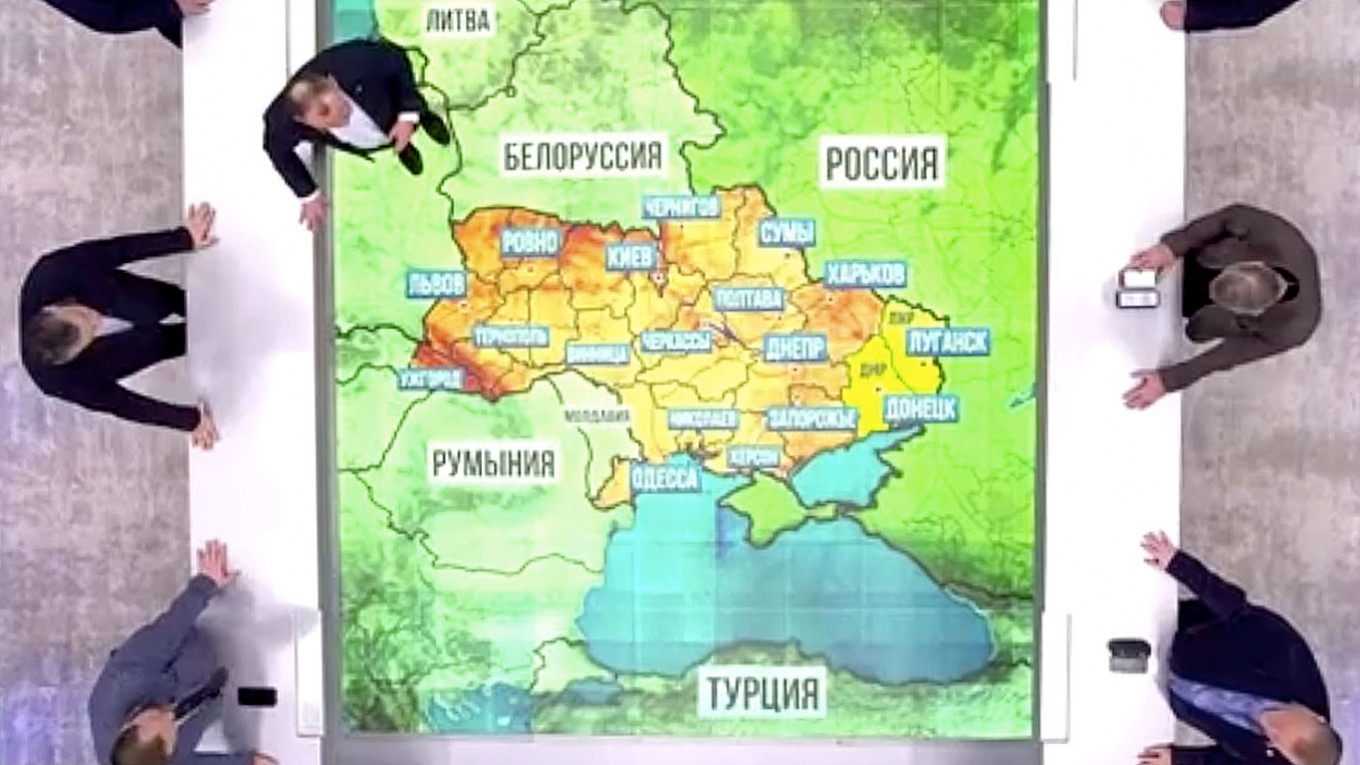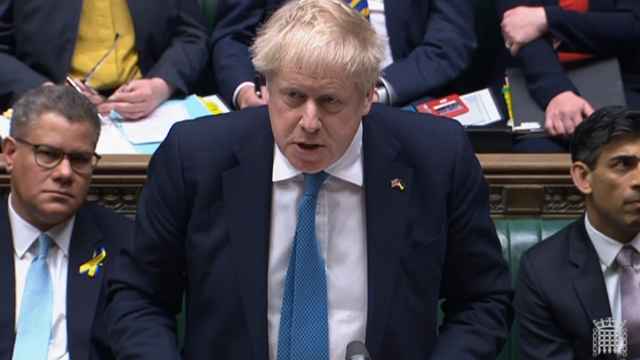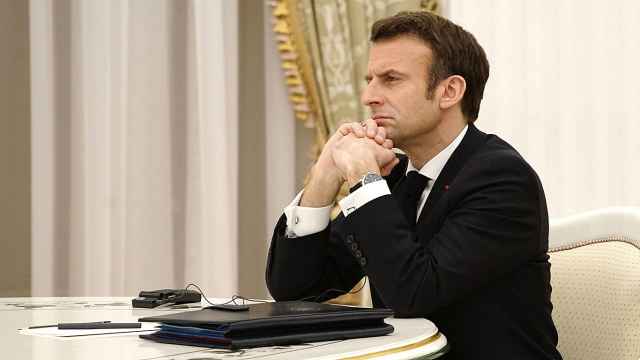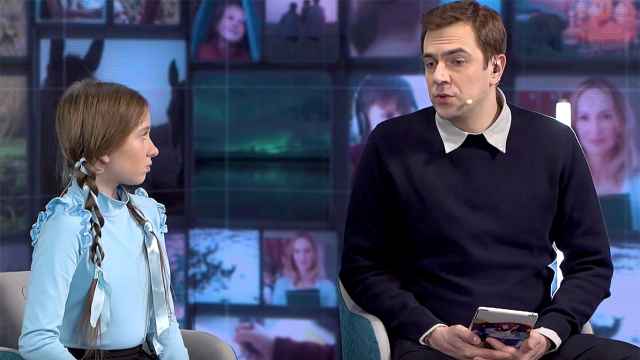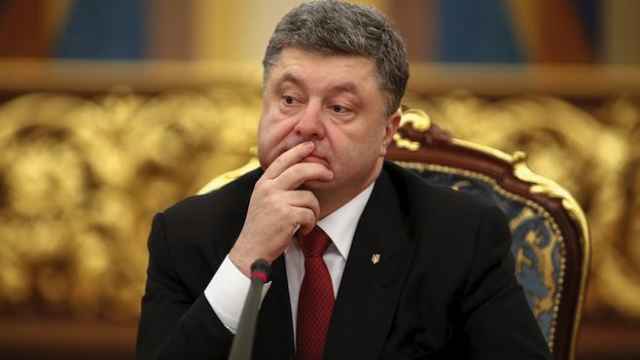“The streets are quiet and calm in the Ukrainian capital,” a news presenter on Russia’s state-run Perviy Kanal TV channel told viewers in a Friday morning news program, while showing live webcam footage of Kyiv on a giant screen behind her desk.
“It is also an ordinary day in Kharkiv,” she said as the footage switched to an apparent live stream of a deserted city center, Ukraine’s second largest, which international media have reported Russian forces have launched missile strikes on and are advancing toward.
“Against the background of lies from the Western media, we are showing you exactly what the situation is right now in Ukrainian cities,” the presenter said.
The surreal broadcast is a snapshot of how Russia’s invasion of its neighbor is being depicted on state TV.
Taking their cue from Russian President Vladimir Putin’s address to the nation early Thursday morning, when he announced a limited “special military operation” to “demilitarize” Ukraine and protect citizens in the Donbas from what he said was a Ukrainian “genocide,” the country’s state TV channels have gone into overdrive to peddle a similar message to a somewhat hesitant Russian public.
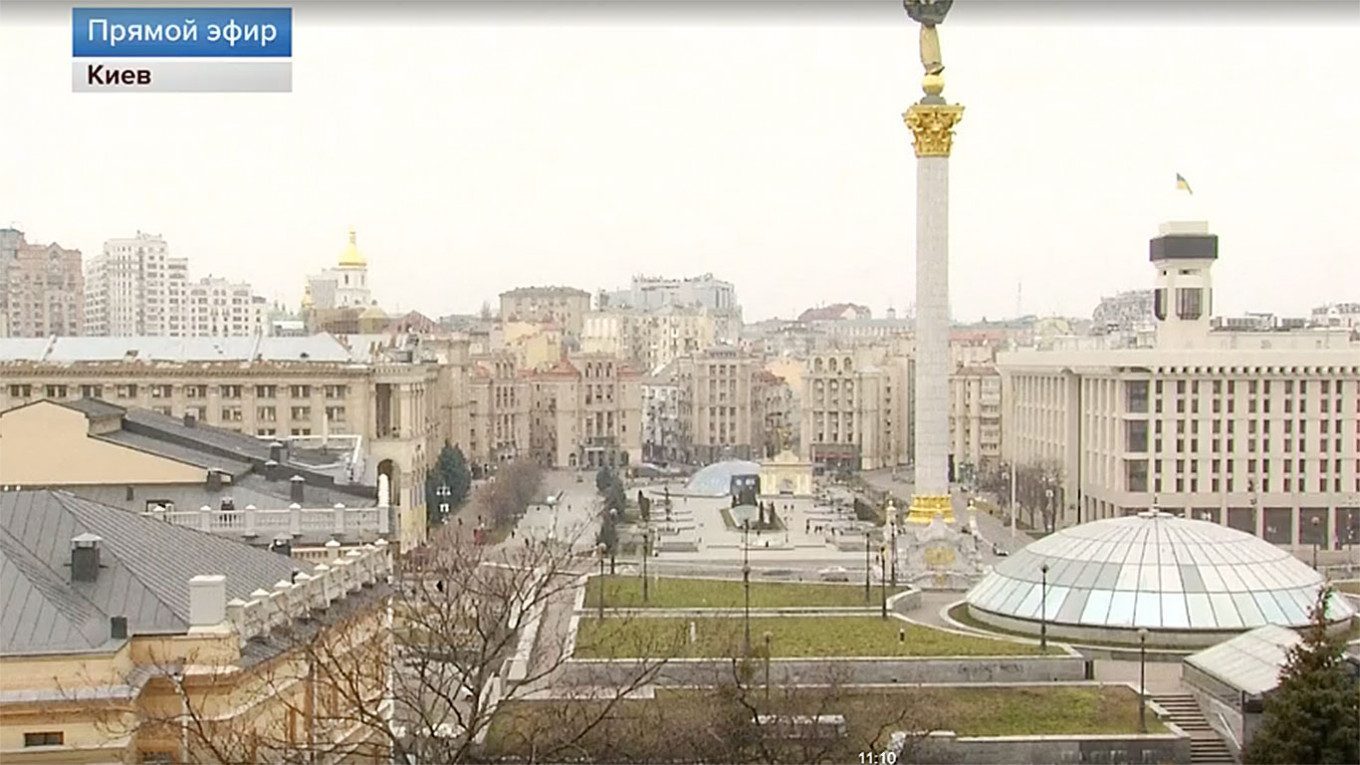
“Ukrainians do not need to fear Russia’s special operation,” said a correspondent for rolling news channel Rossiya-24, as headlines flashed across the screen announcing Russia’s military successes and an apparent imminent Ukrainian threat.
“Ukraine launched three missiles at the Donetsk People’s Republic in the last seven minutes,” a breaking news banner read.
“Russia’s Defense Ministry: The first day’s tasks were completed successfully,” said another. A message pinned to the top of the screen read: “All Ukrainian service personnel who voluntarily lay down their arms can return home peacefully.”
All of this is in stark contrast to reports from the ground from other media organizations.
Images of Russian missile strikes on the Ukrainian capital, a firefight with Ukrainian forces for control of an airfield, or Ukrainians sleeping in underground metro stations for fear of Russian overnight raids are nowhere on Russian airwaves.
Russia’s communications watchdog Roskomnadzor on Thursday threatened media outlets with significant fines if they broadcast images and news updates which do not come from official Russian sources. Analysts believe such threats are hardly needed in Russia’s sterile media environment, where TV channels are adept at pushing forward the Kremlin’s narrative across their outputs — from hyped-up choreographed debate shows to selective news bulletins.
In a top-of-the-hour news briefing Friday morning on Rossiya-24, clips from Ukrainian President Volodymyr Zelenskiy’s latest address to the nation were played. A correspondent commented: “He said that Ukraine stands alone. That the West is only offering support in words. NATO will not take Ukraine into its alliance and is not sending troops. Zelenskiy asked for a no-fly zone over Ukraine, but that has been rejected.”
Images of Western arms deliveries to Ukraine over recent months were shown, while a presenter said: “The West, of course, has no real interests in the security of Ukraine, but rather wants to contain Russia.”
Before it invaded, Russia depicted Ukraine as being on the verge of joining the NATO military alliance.
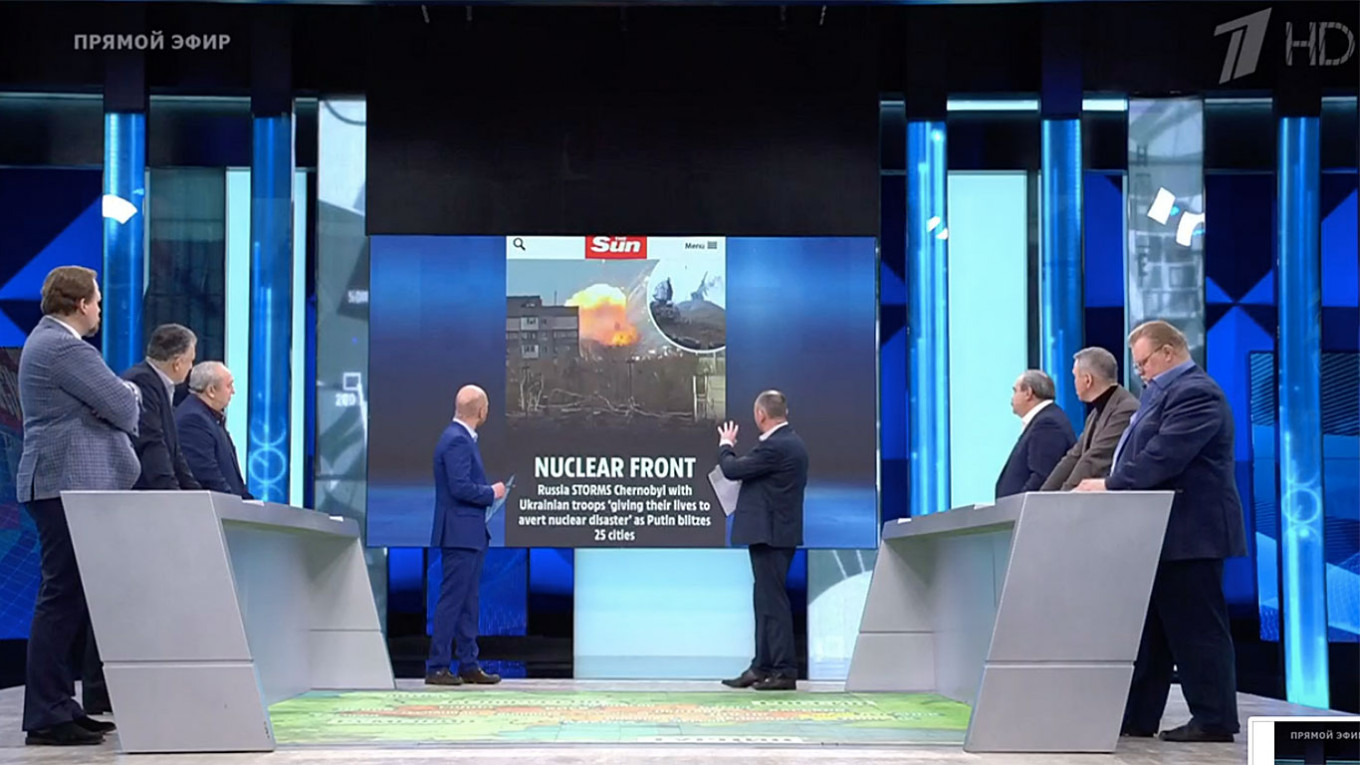
Updates on the military situation are also limited in scope.
On the Vremya Pokazhet (“Time will tell”) morning talk show, the in-studio presenters and guests — eight men — flashed a headline from Britain’s The Sun tabloid about Russian forces seizing Chernobyl, as part of a section criticizing the Western media’s response.
Otherwise, information on Russian advances and actions beyond the Donbas and Crimea were not discussed. Updates were limited to statements from Russia’s Defense Ministry about “military objects being destroyed” and Russian forces “pushing the Ukrainian resistance back another kilometer in Donetsk.”
There was no discussion of Russian losses — either personnel, which Britain estimated could have reached 450 in the first day of the assault, or equipment.
Videos shot by the FSB of Ukrainian soldiers who “refused to continue serving on the territory of their country” were given prominence, as was grainy smart-phone footage from inside the self-proclaimed Donetsk and Luhansk Peoples’ Republics, purporting to show damage from what correspondents said were Ukrainian attacks.
At the same time, Western coverage showed live footage of a destroyed residential building in Kyiv, struck by Russian airstrikes overnight. Western media carried reports of civilian injuries and eyewitness accounts of explosions and gunfire in a suburb just north of Kyiv, as Russian forces approach the Ukrainian capital.
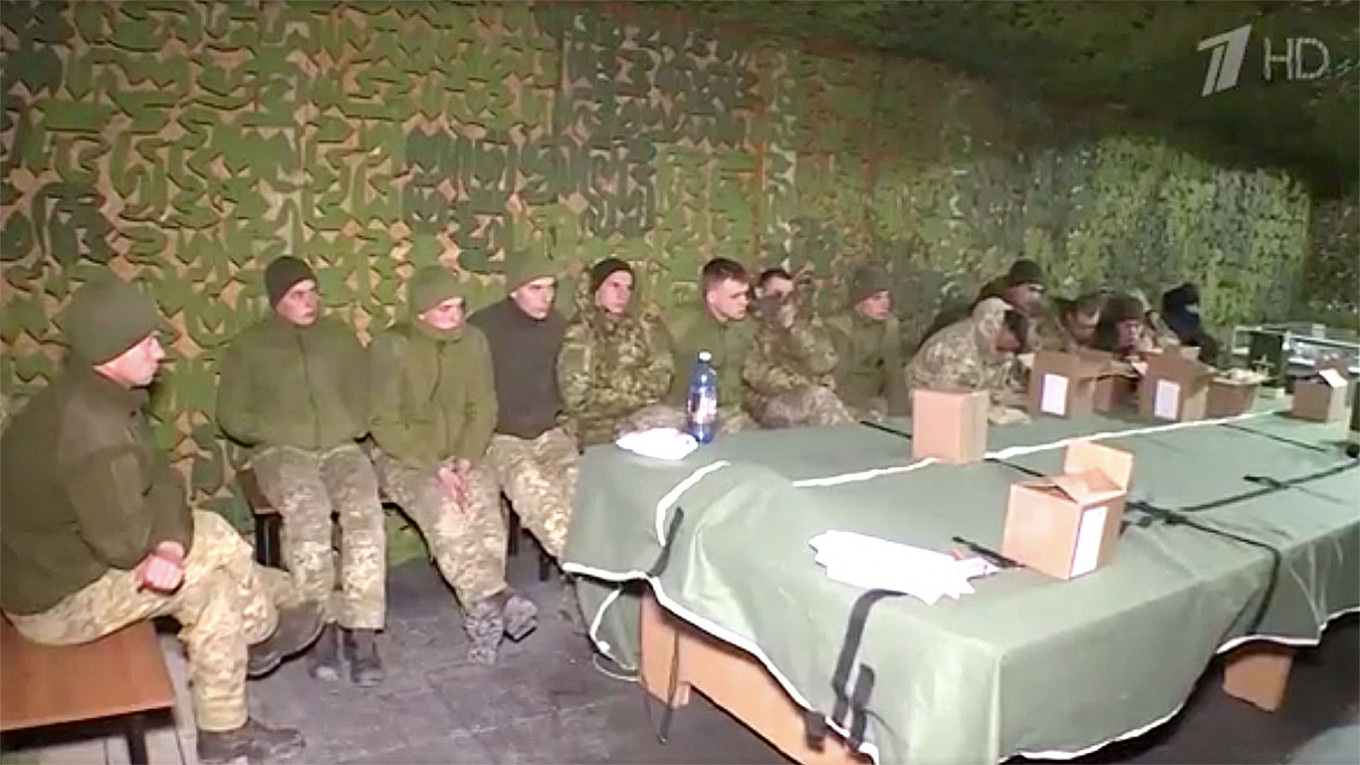
Russia’s presenters also aped Putin’s language on Ukraine, referring to “the current regime” or “the situation on the territory of Ukraine.” Commentators say that referring to Ukraine as a “territory” rather than a country or state is part of the Kremlin’s campaign to undermine Ukraine’s sovereignty in the eyes of the Russian public.
“We really don’t like that we had no other options, but that’s the case,” said Vremya Pokazhet host Artyom Sheynin, one of the Kremlin’s most highly paid propagandists, as he invited his guests to weigh in on the merits of Russia’s invasion.
“The West impacts our lives. You can’t deny it,” said one.
“We had to take this action to demilitarize Ukraine and provide safety and security.”
A Message from The Moscow Times:
Dear readers,
We are facing unprecedented challenges. Russia's Prosecutor General's Office has designated The Moscow Times as an "undesirable" organization, criminalizing our work and putting our staff at risk of prosecution. This follows our earlier unjust labeling as a "foreign agent."
These actions are direct attempts to silence independent journalism in Russia. The authorities claim our work "discredits the decisions of the Russian leadership." We see things differently: we strive to provide accurate, unbiased reporting on Russia.
We, the journalists of The Moscow Times, refuse to be silenced. But to continue our work, we need your help.
Your support, no matter how small, makes a world of difference. If you can, please support us monthly starting from just $2. It's quick to set up, and every contribution makes a significant impact.
By supporting The Moscow Times, you're defending open, independent journalism in the face of repression. Thank you for standing with us.
Remind me later.



